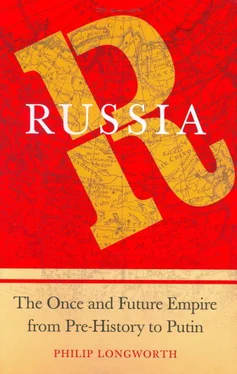Crowned at his own instance in January 1547, the sixteen-year-old tsar was also seized of new ideas. If he did not actually read Machiavelli, evidence suggests that he was acquainted with many of the Italian’s precepts. A German immigrant, Hans Schlitte, fired his interest in German science, and he seized eagerly on information about new technology. The Tsar sent Schlitte back to Germany with commissions to recruit doctors, artisans, and experts in explosives and other Western arts. A Dutchman called Akema and a citizen of Hamburg called Marselius were soon to found a firearms manufactory at Tula, which was to be developed into the centre of Russia’s arms industry. In 1550 Ivan founded a corps of musketeers (streltsy) — six companies of them in the first instance. His other acts suggest that he was intent on shoring up his legitimacy and on acting as a new broom (a symbol he adopted later for his most notorious institution, the oprichnina) in reforming the administration. In his first months as tsar no fewer than thirty-nine new saints were canonized, including many of his ancestors in the House of Riurik — enlargers of the state of Muscovy, and protectors of the Orthodox Church. Not only did these canonizations proclaim the values of the new regime, they invested it with an aura of sanctity.
Others of Ivan’s immediate concerns were to extend and enforce the law, to root out corruption, and to stamp out the factionalism which had marred his boyhood. Above all, he wanted to enforce obedience. In 1550 a new law book was issued. Besides repeating previous legislation, this co-ordinated the operations of central and local government, laid down rules for due process, and required court decisions to be recorded. Ivan’s first months in power were also marked by the expansion of the ministerial council, which reflected the use of patronage to bolster his authority. However, critical decisions were pondered by a kitchen cabinet of close advisers — the ‘Chosen Council’ — among them a learned monk called Silvestr, who did duty in one of the Kremlin churches; a foreign-policy specialist, Daniil Adashev; and a military specialist from the western provinces, Prince Andrei Kurbskii. It was with this group that in 1551 Ivan decided to mount his first great campaign the following year — against Kazan.
The Khanate of Kazan occupied a strategic location adjoining Muscovy’s southern frontier, and Moscow had interfered in its affairs for decades past. However, the influence exerted was only intermittently effective. Control over Kazan needed to be secured. A phase of political instability there encouraged Ivan and his advisers to launch a major campaign to seize the city. 6Kazan was defended by walls the height of three grown men and more, and by 30,000 Tatars. But young Ivan brought 150,000 troops to the scene, as well as siege equipment, explosive devices, and a train of 150 guns. A siege began on 23 August 1552.
The preparations had been thorough, and steps were taken to maintain the troops’ morale. Immense drums were pounded by a battery of drummers to give the Russians encouragement; shawms and trumpets brayed in alarming unison to inspire the Tatar defenders with dread. Standards bearing images of Christ or of warlike saints like Demetrius and George, or pious slogans prophesying victory, waved and billowed over the serried regiments, demonstrating the Russians’ view that their army was the visible army of Christ and its every campaign a holy mission. For them, as for the Byzantines, every war they fought was a crusade, and every enemy — Polish, Swedish or Livonian as well as Tatar — was heathen or heretical. 7Tsar Ivan himself presided over the siege in style. As the Englishman Richard Chancellor, who came to Russia soon afterwards noted, ‘his Pavillion [i.e. tent] is covered eyther with Cloth of Gold or Silver, and so set with stones that it is wonderfull to see it. I have seene the Kings Majesties of England and the French Kings pavilions, which are fayre, yet not like unto his.’ 8But, unlike Henry VIII’s meeting with Francis I on the Field of the Cloth of Gold, this was no meeting between equals. Forty days after the siege began, explosives breached the walls, the Russian troops stormed in and after a bloody fight secured the city
Kazan did not become a client state of any kind. That approach had been tried and had failed. Nor was it accorded any autonomy or separate administration to suit the ethnic and religious preferences of its conquered population. (However, some members of the Tatar elite threw in their hand with Russia and were soon employed in fighting Ivan’s wars on other fronts.) 9Kazan simply became a Russian province, administered by a Russian governor responsible for both civil and military affairs, and by a supporting staff of government clerks and servicemen. Russians were soon being encouraged to settle there. Before long, thanks to this and outward Tatar migration, the population of the city itself was soon overwhelmingly Russian. Kazan became an archdiocese, and its energetic archbishop was soon administering big church-building and missionary programmes. 10
The impetus of this southward drive for empire did not end at Kazan. Ivan’s eyes were already focused on the country beyond, on the Khanate of Astrakhan, which commanded the estuary of the river Volga and the roads to Central Asia and to the steppe lands at the approaches to the Caucasus, where the Nogai Horde roamed. In order to realize his strategic plan in the south, Ivan needed to ensure Nogai compliance. But he knew that the Nogais depended on trade with Muscovy, supplying it with as many as 50,000 horses a year. Partly for this reason, many Nogais welcomed Russia’s taking control of the strategic commercial roads between Asia and Europe which the Khazars had once commanded. 11
These considerations help to explain a letter that Ivan sent to the Nogai Horde a few weeks after the capture of Kazan. In it he gave implicit warning of what the price of resistance would be. When Kazan had fallen, he wrote, its defenders had been slaughtered and the women and children taken as slaves. The Khan himself, however, had been spared and deported to Russia, where he had been allotted an estate for his maintenance. The Nogai Tatars were welcome to trade, but were made to understand that the Tsar would brook no attempt to challenge the political arrangements he proposed for the region. The city of Astrakhan was annexed, securing control of the Nogai steppe and providing access to the Caucasus, the northern gateway to Asia. This had immense implications for Russia’s imperial future.
As is often the case with expanding empires, some people in Russia’s expected line of march rushed to offer their allegiance even before the would-be conqueror arrived. Some Christian princelings of the Kabarda region of the Caucasus did so even before Ivan’s victory over Astrakhan. In 1555 Prince Kudaduk and Prince Sisak formally submitted to the Tsar’s representative, along with with 150 of their warriors. Two years later more did so. These Kabardinian chiefs and their followers were known as Circassians (Cherkessy). The Russians thought they were pledging allegiance in the hope of support against hostile neighbours, but they made similar overtures to the Crimean khan and to the shamkhal of Dagestan, so they may have been seeking insurance or simply making a gesture of recognition — Caucasian politesse. In any case, in 1560 Ivan sent 500 musketeers and 500 Cossacks there, ostensibly to help the Circassian Prince Temriuk. It proved to be the beginning of a fateful relationship that has lasted to this day.
A people accustomed to flatlands, the Russians now confronted the most mountainous and exotic region of Europe. For sixteenth-century man, mountains lacked the romantic aura they were to attract in the late eighteenth and the nineteenth centuries. They were difficult of access, and harboured dangerous peoples. Yet Russia was already becoming involved in the very centre of the Caucasus, the Kabarda. The chief lure was commerce. The Kabarda straddled the roads from the Crimea to the town of Derbent on the Caspian, and from the river Terek in the north to Georgia in the south.
Читать дальше





![Stephan Orth - Behind Putin's Curtain - Friendships and Misadventures Inside Russia [aka Couchsurfing in Russia]](/books/415210/stephan-orth-behind-putin-s-curtain-friendships-a-thumb.webp)





